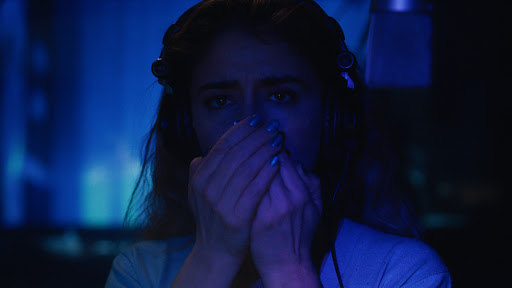Director Natalia Meta injects The Intruder with a sense of unease. Her film is slow and hard to grasp, which does create a strong atmosphere. However The Intruder ultimately falls short and ends up rather perfunctory for a film about reality breaking down. If you’ve seen Berberian Sound Studio or any number of schizophrenic thrillers, The Intruder breaks no new ground.

Based on a novel by C.E. Feiling, this Argentinian film feels novelistic in that it follows just one perspective and doesn’t differentiate between what seems real and unreal. Erica Rivas plays the lead role of Inés, a character who ends up going down a path that is unexplainable. The film opens with sadomasochistic imagery, which immediately grabs attention. Inés spends the film’s prologue stuck in confined spaces. Everyone, from air stewardesses to her partner, invade her personal space. She is stuck on an aeroplane, in an underground lake, and in bathrooms. This claustrophobia sets the stage for disaster, which peaks fully twenty minutes in, and uses the screams to transition into music and titles. From then on, The Intruder is a film of trauma.
There is no way to react to trauma in a way that everyone understands. Inés spends the rest of the film feeling lost and alone, even when around people. The Intruder has a creeping sense of uncertainty, and it becomes hard to know what is happening and why. The breakdown of the barrier between reality and dreams makes the film eerie. The similar presentation of each allows the film to smoothly move into increasing ambiguity. The fantasy is very slight and rarely obvious. Though Inés does have to go into a dreamworld, and she keeps on waking up, through layers of dreams within dreams. These moments are some of the strongest in The Intruder, as they utilise the crisp cinematography and simple style to wind up the tension and ground it with the lead character. In a film where a lot is not exactly real, keeping things simple allows it to never become overburdened.

Sadly The Intruder ends up a little disconnected. Its prologue and subsequent acts are quite distinct and don’t totally sync up. The hallucinations are rather obvious, but the intrigue is finding out why they are occurring. The answer itself is fairly underwhelming, and some may even consider it tacky or offensive. This is a film with a fair bit of predictability and genre clichés. Although the execution is certainly compelling for the most part.
Inés has a job providing dubbing for some graphic movies, and the recreation of violence is a nice way for the film to add thrills without getting nasty. It also allows the film to utilise some rich sound design. The Intruder is full of choirs, organs, songs, screams, and horror sound effects. It creates a mischievous sonic landscape, which complements the film’s mysterious tone and frequent use of humour.
The Intruder is put together well. The atmosphere and sound design are great. Sadly it never escapes the shackles of being a relatively standard thriller. The way it plays with trauma, dreams, and gender are interesting enough. Yet the disconnected plot, with ultimately little complexity, leaves just a mild impression. The Intruder is a respectable work, but it’s little more than that.
The Intruder screened at London Film Festival 12 October 2020
